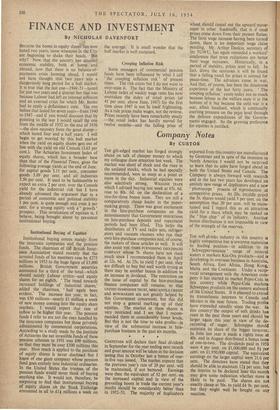FINANCE AND INVESTMENT
By NICHOLAS DAVENPORT
BECAUSE the boom in equity shares has now lasted two years, some wiseacres in the City are beginning to shake their heads. But why? Now that the country has attained economic stability, both at home and abroad, now that there is no balance-of- payments crisis looming ahead, I would not have thought that two year was a dangerously long period for a bull market. It is true that the last one-1949-51—lasted for just two years and a quarter but that was because Labour had left an internal inflation and an external crisis for which Mr. Butler had to apply a deflationary cure. The one before that lasted for seven years—from 1940 to 1947—and if you would discount that by pointing to the war I would recall the one from the middle of 1932 to the end of 1936 —the slow recovery from the great slump— which lasted four and a half years. I will begin to get worried by this bull market when the yield on equity shares gets out of line with the yield on old Consols (3.65 per cent.). The Actuaries Investment Index of equity shares, which has a broader base than that of the Financial Times, gives the following average yields at the end of June: for capital goods 5.11 per cent., consumer goods 5.89 per cent. and all industries 5.56 per cent. It used to be fashionable to expect an extra 2 per cent. over the Consols yield for the industrial risk but I have already advanced the argument that in a period of economic and political stability 1 per cent. is quite enough and even I per cent. for a strong equity with a' growth' prospect. This revaluation of equities is, I believe, being brought about by persistent institutional buying.
Institutional Buying of Equities
Institutional buying comes mainly from the insurance companies and the pension funds. The chairman of tht British Insur- ance Association stated recently that the invested funds of his members rose by £275 millions in 1953 to the huge figure of £3,800 millions. British Government securities accounted for a third of the total—which should satisfy Labour critics—and equity shares for an eighth. The trend towards increased holdings of industrial shares,' added the chairman, had again been evident.' The increase last year, in fact, was £50 millions—nearly £1 million a week of new money coming into the equity share markets. I would expect that rate of inflow to be higher this year. The pension funds I refer to are not the ones handled by the insurance companies but those privately administered by commercial corporations. According to a study made by the Institute of Actuaries the net investible funds of these pension schemes in 1951 was £90 millions, so that they must be over £100 millions this year. How much is applied to the purchase of equity shares is never disclosed but I know of one giant company whose pension fund goes entirely into industrial ordinaries. In the United States the trustees of the pension funds would never think of buying anything else. It would not, therefore, be surprising to find that institutional buying of equity shares on the Stock Exchange amounted in all to £11 millions a week on the average. It is small wonder that the bull market is well sustained.
Creeping Inflation Risk Some managers of commercial pension funds have been influenced by what I call the creeping inflation risk ' of present times. The risk exists but I do not want to over-state it. The fact that the Ministry of Labour index of weekly wage rates has now overtaken the index of retail prices (at 41 per cent. above June, 1947) for the first time since 1947 is not In itself frightening. As a rule prices make wages, not the reverse. Prices recently have been remarkably steady —the retail index has hardly moved for twelve months—and the falling price of wheat should cancel out the upward move- ment in other foodstuffs, that is if meat prices come down from their present flutter. The farm wage increase having been turned down, there is no important wage claim pending. Mr. Arthur Deakin, secretary of the TGWU, Itas again reminded a workers' conference that price reductions are better than wage increases. Historically, in a period of stability, prices tend to fall. In fact, down the centuries it will be found that a falling trend for prices is normal for peace-time. The advances come in war. And that, of course, has been the disastrous experience of the last forty years. The creeping inflation' exists today not so much because labour in the welfare state is' at the bottom of it but because the cold war is a war, albeit localised, which is continually exerting pressure on the price level through the defence expenditures of the Govern- ments engaged. So the growing preference for equities is justified.


































 Previous page
Previous page